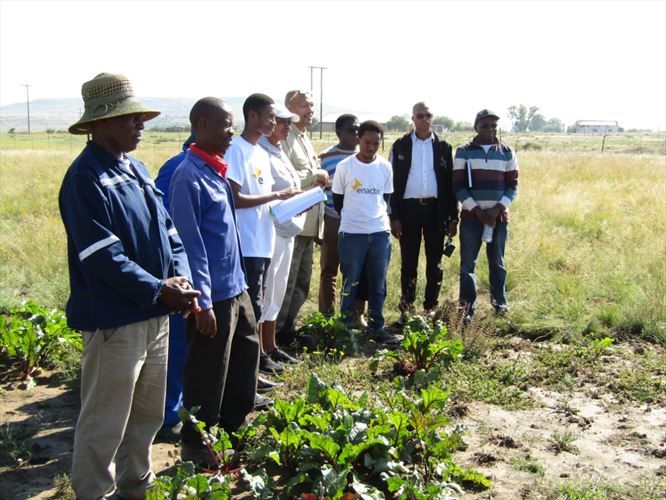Ford news

Ford Invests in Pioneering Student Initiatives
- Ford C3 is a student-led signature educational programme of Ford Motor Company Fund, run in partnership with global non-profit organisation Enactus
- Incumbent Enactus Ford College Community Challenge (C3) students honoured at this year’s virtual awards ceremony
- New winners selected for the seventh cycle of the Enactus Ford C3 Challenge in 2020/2021 each to receive $5 000 grant
Pretoria, South Africa, 17 July 2020 – Ford Motor Company continues building on its commitment to empowering the youth through education and entrepreneurship with the announcement of the winners of the Ford College Community Challenge (C3), run in partnership with global non-profit organisation Enactus.
Ford C3 is a signature educational programme of the Ford Motor Company Fund, the philanthropic arm of Ford Motor Company. In partnership with Enactus, it promotes the development of innovative solutions amongst university students to address critical needs in their communities. Projects are supported in Ghana, Kenya, Morocco, South Africa, Brazil, the United States, Germany and the United Kingdom, striving to create a more sustainable place to live and work.
Ford Fund invests more than $18 million each year in forward-thinking education programs that provide opportunities for people to achieve economic success and enhance community prosperity.
“We have a longstanding partnership with Ford,” adds Letitia de Wet, Chief Executive Officer and Country Director for Enactus South Africa. “The work that these students do not only transforms the lives of the communities and the social ills they address, but it helps these young students develop the kind of talent and perspective that is essential to positive transformation in our country.”
Last year marked the sixth round of the Enactus Ford C3 Building Sustainable Communities Project in South Africa and saw four universities selected as winners. This year, for the first time, the teams were not present to receive their trophies but were honoured virtually for the successful implementation of their pioneering student-led initiatives at the Enactus National Competition.
“We are extremely proud of the concepts the student teams came up with for making a difference in their communities, and are inspired by the positive impact they have made,” says Neale Hill, Managing Director, Ford Motor Company of Southern Africa.
The Cape Peninsula University of Technology in Cape Town was chosen for its Grow a Seed Urban Farming project which addressed two of the United Nations Sustainable Development Goals: Decent Work and Economic Growth, and Responsible Production and Consumption. It introduced aeroponics to the Khayelitsha farming community as a sustainable farming method where produce is grown in nutrient-rich water that is circulated continuously around the system. This ensures that the plants receive adequate water and nutrients without being planted in soil.
At the Mangosuthu University of Technology near Durban, solar panels were installed in a local community centre that was not being utilised. This system recharges a clever portable lighting device the team developed titled Ukukhanya which, loosely translated, means “providing light”. It is made from a two-litre bottle, LED bulb, resistor, wires, switch, battery holder and a removable and rechargeable 3.7v lithium battery. It is used mainly by learners as they study in the evenings.
Food security in township areas takes priority for the student team from University of KwaZulu-Natal as it introduces Project Sack Space – a cost-effective form of vertical farming for low-income households. This enables planting fresh vegetables in larger quantities in a limited space, which makes it more practical than conventional farming.
At the University of the Free State’s QwaQwa Campus, the student team have been assisting an existing farm, Shayuphondo, with the introduction of organic farming practices, and developing its employees with business management skills and the establishment of additional business ventures to create more sustainable income for the beneficiaries. Rural women and men, as well as the youth of Msinga, benefit from this project.
“This year is certainly a year we will never forget. The impacts of the COVID-19 pandemic are only starting to be felt. In recent months we have all faced different challenges and no doubt there are more to come,” Hill says. “Enactus embodies the spirit of finding unique innovative solutions to complex problems, something we need today more than ever.”
The finalists selected for the seventh cycle of the Enactus Ford C3 national competition for 2020/2021 have been announced, each of which will receive a $5 000 grant to implement their projects over the next 12 months.
The Central University of Technology will partner with a local agricultural cooperative called Village Fa Global Parliament where they will utilise empty two-litre bottles to produce an irrigation system, old malfunctioning fridges to create worm compost and reclaimed wood to build bee hives. Their goal is to reduce youth unemployment and improve living conditions in the communities.
Rhodes University has identified an innovative initiative for those who do not have their own method of transport. In Grahamstown minibus taxis are used by many as their primary means of transport, however taxis tend to be isolated to one part of town and are only available for a limited amount of time, which means residents struggle with accessibility to a reliable transport system. Students have therefore initiated the Grahamstown E-Bikes project which aims to make commuting within Grahamstown cheaper and more environmentally friendly through the renting out of electric bicycles.
The University of KwaZulu-Natal has created an app called SmartGro. The application will assist students by allowing them to order their groceries online and having them delivered to their residences. SmartGro will also have a feature which will provide financial literacy and budgeting workshops to students who are financially illiterate, alleviating poor financial management, which is a contributor to food insecurity. Furthermore, SmartGro will also offer student businesses and university-based projects a platform to sell their products.
Project Re-fuel is the University of Mpumalanga’s project. It is a waste recycling and fuel production project that seeks to leverage pyrolysis, a recycling technique that converts plastic waste into fuels by a thermal and catalytic cracking process.
“The new group of finalists chosen for the 2020/2021 Enactus Ford College Community Challenge did not fail to impress, sharing inspiring projects that will have a profound and positive impact on our communities,” concludes Hill.
Read the latest news from Ford South Africa by visiting the Newsroom:
https://www.ford.co.za/about-ford/newsroom/
Original article and image as supplied by QuickPic











